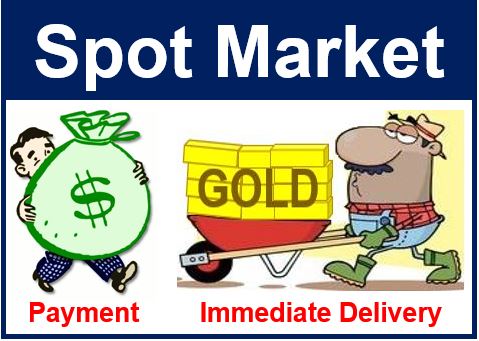What is the spot market? Definition and meaning
The Spot Market, also known as the Cash Market or Physical Market, is a public financial market in which commodities or financial instruments are bought and sold for immediate delivery (or within a couple of days, depending on local regulations).
The price quoted for a purchase or sale on the spot market is called the spot price.
The spot market contrasts with the futures market, where delivery occurs at a later date.
Some commodities are sold at spot prices and delivered at a future date (of up to one month). Crude oil is an example.
 In the spot market, you pay now and get it now (or very, very soon).
In the spot market, you pay now and get it now (or very, very soon).
Purchases are paid for in cash at current prices set by the market, rather than the price at the time of delivery.
The Nasdaq Business Glossary says the following about cash markets:
“Also called spot markets, these are markets that involve the immediate delivery of a security or instrument.”
Spot market trading occurs in many places
The spot market may be:
- an organized market,
- an exchange, or
- OTC (over-the-counter) – not on an exchange
Wherever there is an infrastructure where the transaction can be conducted, spot markets will operate.
The Forex (foreign currency trading) market is a massive spot market that allows for the immediate exchange of one currency for another.
Both perishable and non-perishable commodities are traded in the spot market. Non-perishable commodities, such as silver or gold, are set at a price that reflects the future price, while the prices of perishable commodities, such as fruit or grain, will be influenced by supply and demand.
For example, in the northern hemisphere, tomatoes purchased in the summer will reflect the abundant supply of the commodity, which will contrast with January, when harvests are smaller and prices are higher. One cannot buy tomatoes for delivery in January at July’s prices.
Geopolitical events can cause significant fluctuations in the spot prices of commodities, as they may affect immediate supply and demand dynamics.
Compound nouns – example sentences
In business and financial English, there are many compound nouns containing the words “spot market.” A compound noun is a term that consists of two or more words. Here are six of them, their meanings, and examples of how we can use them in a sentence:
-
Spot Market Price
The current market price at which a particular commodity can be bought or sold for immediate delivery in the spot market.
Example: “The spot market price for crude oil fluctuated due to geopolitical tensions affecting immediate supply.”
-
Spot Market Trading
The act of buying and selling commodities or securities for immediate delivery on the spot market.
Example: “She specializes in spot market trading, focusing on the rapid buying and selling of foreign currencies.”
-
Spot Market Value
The valuation of a commodity or asset based on the current prices in the spot market.
Example: “Investors paid close attention to the spot market value of gold amid economic uncertainty.”
-
Spot Market Liquidity
The degree to which an asset or security can be quickly bought or sold in the spot market without affecting its price.
Example: “High spot market liquidity for company shares is indicative of a healthy level of trading activity and interest.”
-
Spot Market Volatility
The rate at which the price of a commodity or security in the spot market increases or decreases for a given set of returns.
Example: “Spot market volatility is often higher during economic reports that impact commodity-based currencies.”
-
Spot Market Transaction
A purchase or sale of a commodity or security that occurs immediately or within a short time frame in the spot market.
Example: “Each spot market transaction was meticulously recorded to ensure compliance with regulatory standards.”
Video – What is the Spot Market?
In this visual guide presented by our affiliate channel, Marketing Business Network on YouTube, we explain what the “Spot Market” is using straightforward language and easy-to-understand examples.

